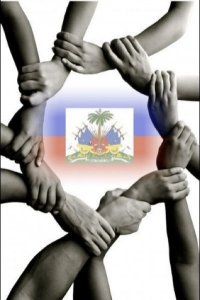 The trauma remains fresh for survivors of the magnitude 7.0 earthquake. Nearly a million remain in tents and other temporary housing
The trauma remains fresh for survivors of the magnitude 7.0 earthquake. Nearly a million remain in tents and other temporary housing
By Tracy Wilkinson, Los Angeles Times
January 12, 2011, 4:23 p.m.
Hundreds of white balloons were released into the air, buglers played taps and Haitians sang their national anthem a capella Wednesday afternoon to mark the moment when exactly one year ago a ferocious earthquake destroyed much of the nation’s capital and killed more than 300,000 people.
The magnitude 7.0 quake, which left the Western Hemisphere’s poorest country reeling, wrecked tens of thousands of homes, hospitals, government buildings and national symbols such as the Roman Catholic cathedral and the presidential palace.
A year later, nearly a million Haitians remain in tents or other temporary shelter. The death of so many has left gaping holes in Haitian society, and the psychological wounds are still fresh.
In this fervently religious nation, Wednesday was an official “day of reflection.” To mourn, thousands of Haitians walked miles to reach churches throughout Port-au-Prince, the capital, where priests and ministers extolled survivors to be thankful they were alive and to never forget the dead. In at least one case, a minister also scolded the international community for failing to achieve significant reconstruction.
Survivors filled the streets for hours. Rail-thin men dressed in polyester suits. Women in bonnets, Bibles tucked under their arms, hauling well-scrubbed children. Little girls wearing ribbons of every color in their hair. And amputees, hobbling along on crutches. Most wore pristine white, the color of mourning in Haiti.
For some, the experience seemed overwhelming. Men and women stopped in their tracks, raised their hands heavenward and shouted prayers. Others wailed and sobbed, the trauma still fresh in their troubled minds.
At the late-19th century Notre Dame Cathedral of Port-au-Prince, where little more than a pink stone facade remains, people crowded into a park to pray and remember.
Suafet St. Jean, dressed in her Sunday best, had walked an hour to reach the cathedral. A year ago, she was working as a street vendor, selling rice on a corner, when the ground vibrated and everything turned into something dreamlike.
“And when I woke up there were dead bodies all around,” including all of the women she had been working with, St. Jean recalled. “I was no better a person than any of them, so I came here today to thank God for sparing me.”
She broke into tears.
The cathedral is an apt metaphor for the state of Haiti’s recovery. It looks much as it did a year ago: Large chunks of concrete and pieces of stained glass litter what were once the halls, apse and sanctuary of the cavernous structure. The head of the Roman Catholic Church in Haiti, Archbishop Joseph Serge Miot, was killed in the quake, along with other members of the hierarchy and numerous priests, nuns and Protestant preachers.
Pope Benedict XVI on Wednesday named Miot’s replacement. The Vatican said Msgr. Guire Poulard, bishop of Les Cayes, was the new archbishop of Port-au-Prince and Msgr. Glandas Marie Erick Toussaint was auxiliary bishop.
Memorial ceremonies dotted the capital. In the massive sprawl of refugee tents through the central Champs du Mars, the government set up a platform with speakers and musical entertainment. “Celebrate life!” called out one of the participants. Nearby, signs warned of the cholera epidemic that has killed nearly 4,000 people in recent months.
A few yards away, Daphne Delva was washing her 2-year-old son Jefferson on the curb, in front of the tent where she and 10 other people have lived for a year.
“I thought by now they would have moved us,” she said as she lathered the tiny boy. “You can never be at peace. Anything can happen at any time. They fight, they throw rocks.” She pointed to holes ripped in the tent.
Delva’s tent faces the compound that contained the presidential palace, a white-domed structure crumpled in the quake.
Delva’s tentmate Mirlande Jean guffawed at the thought of depending on Haiti’s government or President Rene Preval. “We don’t have a president,” she said. “A year here and I haven’t seen him. We don’t even talk about a government.”
In a sign of the political tension seething just below the surface, a crowd burned tires and a motorcycle, witnesses said. There were reports of gunfire in the Delmas neighborhood, with witnesses saying they saw three men wounded.
The Nov. 28 presidential election was riddled with fraud, international monitors say, and there is widespread dispute over whether Preval’s handpicked candidate should be allowed to proceed to a second round of voting.
Copyright © 2011, Los Angeles Times